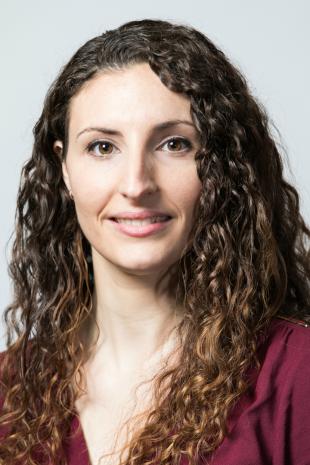"I really enjoy the freedom to do the research I want to do, and the opportunities given by the University for personal and professional development. But this position also means working by myself. For me, this is challenging but also very stimulating."
Dr Encarni Medina-Lopez, Chancellor’s Fellow, Institute for Infrastructure and Environment
After gaining her MEng Civil & Environmental Engineering from the University of Granada in 2013, and an MSc in Environmental Hydraulics from the University of Malaga in 2014, Encarni was awarded a Talentia Fellowship to pursue a joint PhD on the effect of humidity in wave energy performance with the Universities of Edinburgh and Granada.
From 2017, she remained in the School of Engineering at Edinburgh as a Postdoctoral Research Associate (PDRA) in Marine Energy, studying the life cycle and techno-economics of marine energy converters, as well as numerical modelling of ocean energy arrays. Alongside this, Encarni led a work package for a multi-million euro project for the European Commission focusing on optimisation of tidal energy farms.In September 2018, Encarni was awarded a Chancellor’s Fellowship in Data Driven Innovation by the University, and is currently pursuing research on the use of remote sensing to tackle the ‘water-energy-environment trilemma’. She is also currently part of the management team for the EPSRC and NERC Centre for Doctoral Training in Offshore Renewable Energy IDCORE.
What sparked your interest in engineering? Is it the same thing that inspires you about engineering today?
I decided to study civil and environmental engineering when I was very young (probably seven or eight years old!). My grandfather was a truck driver, and he was always speaking about how roads could be improved, and about all the amazing constructions he could see during his trips. I decided then that, some day, I would be able to sort those roads and develop incredible things like those he saw during his travels. Now that I know what engineering is about, I am still impressed every time I look at the built environment, but I am also motivated by the real challenges, and the interaction between classical engineering and technological innovations.
Tell us a bit about your career up to this point; what have you enjoyed and what have you found challenging?
I worked for some time in industry before doing my PhD at the University of Edinburgh, and after that, I stayed in academia. A Chancellor’s Fellowship is a tenure-track position where you can balance research and teaching progressively.
I really enjoy the freedom to do the research I want to do, and the opportunities given by the University for personal and professional development. But this position also means working by myself. In the past, I had the support of my supervisors but once I started this new research line, it was a different situation. For me, this is challenging but also very stimulating.
Can you explain your research “in a nutshell”?
My research involves remote sensing for coastal and environmental applications. I particularly work on the prediction of salinity and temperature in the ocean at high-resolution from optical satellite data. My group works in a wider range of topics, ranging from coastal erosion, off-shore renewables, or water quality indicators, all form satellite information.
What do you enjoy most about research and academia at the School of Engineering?
The School of Engineering provides a very diverse environment for self-development. In the same building, we have experts in fire safety engineering, geotechnics, water treatment, structural engineering and more, and that provides a very stimulating atmosphere to work in.
It is also very easy to approach people with ideas and they always do their best to help and promote collaborations within the School and externally.
How would you like your career to develop in the future?
I would like to grow a research group and develop my knowledge and expertise further. The use of remote sensing, big data and artificial intelligence in coastal and ocean engineering is just starting, and I would like to be at the forefront of this new area in the future. I would also like to develop new related courses and improve my teaching skills.
What attracted you to a career in research and academia?
The infinite possibilities that it offers. Within academia you have the freedom to do the research that you really want to do, and that was always very attractive to me. The relevance of academia is sometimes forgotten as research projects take over, but it is important to remember that we are shaping the engineers of the future, and that has always been something very powerful to me.
What career advice would you give for aspiring engineers, particularly young girls and women in STEM wishing to pursue a career in research and academia?
Do it! I would tell them to fight for what they want to do. If you are passionate about engineering and put enthusiasm into it, you will be an excellent professional.
To women, and in general to anyone wanting to follow a career in research and academia, I would say that they should go for it. This is a very rewarding career, challenging at times, but that can make you very happy if you have the motivation.



